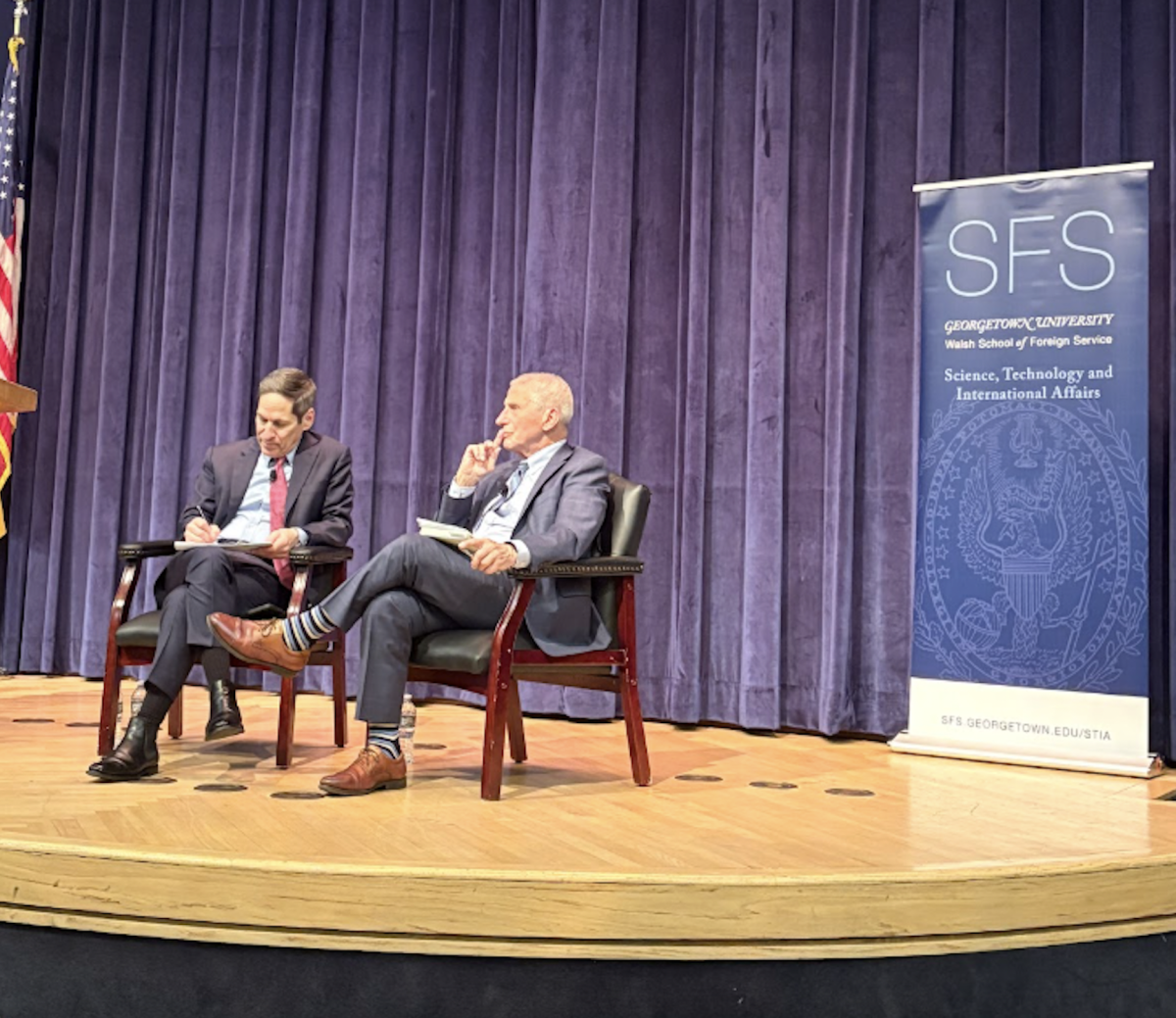
JORDAN LEVIN/THE HOYA | Georgetown hosted Dr. Tom Frieden and Dr. Anthony Fauci as part of the Maloy Distinguished Lecture in Global Health.
Two former U.S. government public health officials shared their insights on the past, present and future of public health policy at Georgetown University’s annual Maloy Distinguished Lecture in Global Health on Oct. 16.
The lecture, originally endowed in 1999 by Paul Maloy (SFS ’68) and Catherine Maloy (NUR ’68), featured Tom Frieden, former director of the U.S. Centers for Disease Control and Prevention (CDC), and Dr. Anthony Fauci, former director of the National Institute of Allergy and Infectious Diseases. Presented by Georgetown’s science, technology and international affairs (STIA) program, the discussion focused on Frieden’s recently published book, “The Formula for Better Health: How to Save Millions of Lives — Including Your Own,” with Fauci moderating.
Frieden said his formula combines scientific knowledge with a willingness to act upon it, offering a method to improve both public and individual health.
“See, believe, create. See the invisible, believe the impossible, create a healthier future,” Frieden said at the event. “Only if we think we can make a difference can we make a difference.”
Frieden added that he originally entered medicine and public health on advice from his father, who was a cardiologist.
“Dad would say very simply, ‘You gotta help the people,’” Frieden said. “This perspective leads to a straightforward question: How can you save the most lives in healthcare?”
Frieden pursued a master’s degree in public health while attending medical school — both at Columbia University — and was previously Assistant Commissioner of Health and Director of the New York City Department of Health’s Bureau of Tuberculosis Control.
Frieden said his experience overseeing tuberculosis control in New York City changed the way he thought and worked. He also said that his mentor asked him a question that changed his life.
“‘He said to me that last year you diagnosed 3,811 patients with tuberculosis in New York City, but you aren’t telling me the most important thing, how many did you cure?’ I didn’t know and was deeply ashamed,” Frieden said. “Science doesn’t give you certainty, but humility.”
Frieden’s book frequently references the Greek myth of Cassandra, who — despite being able to see the future — was cursed to never be believed.
Fauci said there are parallels between Cassandra’s curse and working in public health, a field in which progress in disease prevention and treatment is sometimes met with resistance, like with vaccine hesitancy.
“We might be living through a Cassandra’s curse now about measles,” Fauci said.
Frieden, in response to Fauci, said those who express hesitancy about the efficacy of vaccines and public health information often don’t recognize their utility until it’s too late.
“Vaccines are a victim of their own success. Unfortunately, vaccine hesitancy will be somewhat self-correcting,” Frieden said. “People need to see the product of disease to know why vaccines are so necessary.”
Fauci said past scientific progress should fuel urgency, not complacency.
Referencing a line from Frieden’s book, Fauci noted, “One life saved by heroic and well-publicized medical care is a recognized miracle while millions saved by public health are invisible.” He went on to add, “The essence of public health is to structure society in a way that people don’t have to think about getting sick or dying at any moment.”
Upasya Swarna (SOH ’29), who attended the event, said she appreciated that both Frieden and Fauci emphasized the role of crisis prevention in public health.
“What stuck with me most was their perspective that success in public health is not always defined by newsworthy breakthroughs, but often by the crises that never occur,” Swarna told The Hoya.
The end of the lecture featured a Q&A section, during which Frieden and Fauci fielded questions from audience members and offered insights about the politicization of science and increasing misinformation and disinformation.
Fauci emphasized the role of critical thinking, saying people have a responsibility to challenge where information comes from and recognize uncertainty.
“Treat information as a moving target,” Fauci said. “Utilize the self-correcting nature of science and don’t ever be afraid to say ‘I don’t know the answer to this.’”
Fauci said his decades-long work responding to epidemics and shaping health policy now lies in the next generation of scientists.
“Embrace what you are passionate about,” Fauci said. “We need you.”